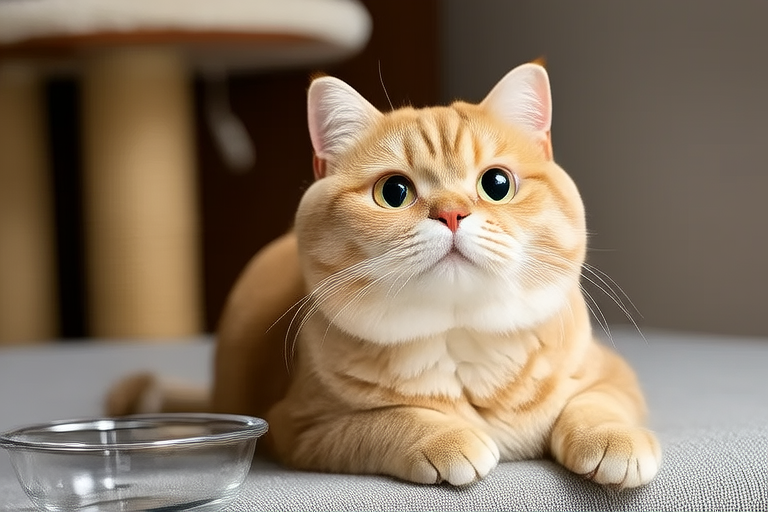How to Care for Your Golden British Shorthair: Tips from a Cat Expert
Welcome to our guide on caring for your golden British Shorthair! These charming cats are known for their beautiful golden coats and gentle, affectionate personalities. As a cat owner, you play a crucial role in ensuring that your feline friend lives a long, healthy, and happy life. In this article, we will cover essential aspects of care, including diet and nutrition, grooming, exercise, health concerns, and socialization and training tips.
Diet and Nutrition
Feeding your golden British Shorthair the right food is vital for maintaining its health and vitality. A balanced diet should include high-quality protein sources like chicken, fish, or turkey. It’s important to choose a food that is appropriate for your cat’s age, weight, and activity level. Kittens need more calories than adult cats, while senior cats may require a diet with fewer calories but higher levels of joint support nutrients like glucosamine and chondroitin.
Avoid feeding your cat table scraps or human food as it can lead to obesity and other health issues. Instead, opt for premium dry or wet food formulated specifically for indoor cats or those with sensitive stomachs. Always provide fresh water at all times, and consider adding a water fountain to encourage drinking.
Consult your veterinarian about supplements if you’re concerned about your cat’s nutritional intake. They might recommend Omega-3 fatty acids for skin and coat health or probiotics for digestive support.
Grooming Needs
The golden British Shorthair has a dense, plush double coat that requires regular grooming to keep it looking its best. Weekly brushing sessions help remove loose hair, prevent matting, and distribute natural oils throughout the fur. Use a slicker brush designed for short-haired cats to gently detangle any knots without causing discomfort.
Bathing is usually unnecessary unless your cat gets particularly dirty or has an issue with dandruff. If bathing is required, use a gentle, pH-balanced shampoo made specifically for cats. Be sure to rinse thoroughly to avoid leaving soap residue behind. Afterward, dry your cat with a soft towel and let it air-dry completely before resuming normal activities.
Trimming nails regularly helps prevent overgrowth and potential injury. You can use nail clippers designed for pets or a nail grinder. Keep sessions short and positive by offering treats as rewards. Additionally, cleaning ears with a cotton ball dampened with a pet-safe ear cleaner can help prevent infections and wax buildup.
Exercise Requirements
Golden British Shorthairs are generally inactive compared to many other breeds, but they still need regular physical activity to stay fit and healthy. Interactive toys such as feather wands or laser pointers can stimulate mental engagement while encouraging movement. Puzzle feeders also promote problem-solving skills and slow down eating habits.
Providing climbing structures or shelves allows your cat to explore vertically within its environment. This mimics natural hunting behaviors and provides mental stimulation. Rotate toys frequently to keep things interesting and challenging for your pet.
Regular playtime not only benefits physical health but also strengthens the bond between you and your cat. Spend at least 15 minutes each day engaging in playful interaction, which can improve mood and reduce stress levels.
Common Health Issues and Prevention
Like all breeds, golden British Shorthairs are prone to certain genetic conditions. Hypertrophic cardiomyopathy (HCM), a heart disease, affects some individuals, so annual veterinary check-ups are essential. Early detection through echocardiograms can lead to better management of symptoms.
Polycystic kidney disease (PKD) is another inherited disorder that causes cysts on kidneys, potentially leading to kidney failure. Screening tests can identify carriers early on, allowing for proactive care.
Obesity poses significant risks to overall wellness, including diabetes and arthritis. Maintaining a healthy weight through proper diet and exercise is key. Monitor portion sizes carefully and adjust as needed based on your cat’s activity level and age.
Vaccinations protect against common illnesses like rabies, feline leukemia virus (FeLV), and calicivirus. Parasite control measures, including flea treatments and deworming medications, should be part of routine preventive care.
Socializing and Training
Socializing your kitten from an early age helps develop confidence and good manners around people and other animals. Introduce new experiences gradually under controlled circumstances, rewarding calm behavior with praise or treats. This builds trust between you and your pet.
Training commands like ‘sit,’ ‘stay,’ or ‘come’ can enhance communication and safety. Positive reinforcement techniques work best; use small food rewards paired with verbal encouragement when teaching desired behaviors. Consistency is crucial in establishing clear expectations.
Encouraging scratching post usage prevents damage to furniture and promotes claw health. Place multiple scratching posts strategically throughout your home and cover them with materials appealing to your cat. Reward appropriate scratching behavior with praise or treats.
In conclusion, caring for a golden British Shorthair involves attention to detail regarding diet, grooming, exercise, health monitoring, and socialization. By following these guidelines provided by a cat expert, you’ll ensure that your beloved companion enjoys optimal wellbeing throughout its lifetime. Remember that every animal is unique, so tailor recommendations according to individual needs and preferences.
